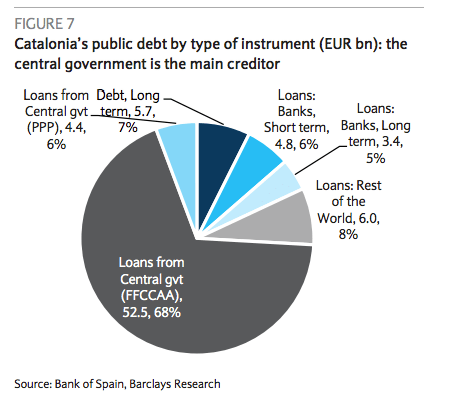Barring some kind of Trump-related disaster overnight, the first thing to watch this week will be Catalonia.
As a reminder, Puigdemont has until 10:00 (08:00 GMT) on Monday to “clarify” exactly what he has “declared” or not “declared.” Assuming he has indeed “declared” something, he’ll have until Thursday to “un-declare” it or else Madrid might simply suspend Catalonia’s autonomy.
“Catalan President Carles Puigdemont will avoid giving a clear response to the Madrid government over whether he declared independence last week,” La Vanguardia reported on Sunday evening. Madrid has apparently “reminded” him that his reply needs to be “clear and simple” where that means either he has declared independence or not.
According to a member of the regional government who spoke to La Sexta, Puigdemont has his response ready. For his part, Jordi Sanchez, leader of separatist group Catalan National Assembly, says Puigdemont’s reply to Rajoy “will be dignified and clear with no surprises.” He added that the Catalan government will not renounce the mandate given by the referendum. Who knows.
Here’s Barclays with a little color:
The conflict could escalate: At this point, it appears more likely than not that Article 155 will be triggered; demonstrations and disruptions by the more radical separatists could follow (even without Article 155 being triggered). It is not clear how Article 155 would be applied; how much control the central government would and could exercise or for how long. On the positive side, the offer by PP, PSOE and Ciudadanos to reform the Constitution – they have the majority required – could help to meet some demands of the moderate nationalist groups in Catalonia. Art 155 might be avoided by calling regional elections.
Fiscal control: The central government has the institutions and legal framework to take fiscal control. In fact, Catalonia has been under the tight budgetary control of the central administration since the financial crisis. On the funding side, as of Q2 17, Catalonia received €52.5bn, or 68% of Catalonia’s €77bn public debt through the central government funding facility, and it is also by far the biggest user of it, representing 33% of its total lending.

While Spanish law contains a no-bailout rule for the regions, in our baseline scenario we expect that the central government will continue to provide the necessary funding to Catalonia so that it can continue to meet its financial obligations.
The Spanish news wire Efe said on its website that the Catalonia government believes the region would continue within the European Union and euro zone if it declared independence, which would necessitate a Catalan central bank. So that’s fun.
Obviously, Spanish equities and periphery spreads are at risk here, but if the past couple of weeks are any indication, the bar is pretty high in terms of something going “wrong” enough to trigger any meaningful moves in the euro. Liquidity is of course ample and the idea that Draghi would let this spiral out of control without resorting to aggressive jawboning seems very slim – especially with the October ECB meeting right around the corner.













Leave A Comment